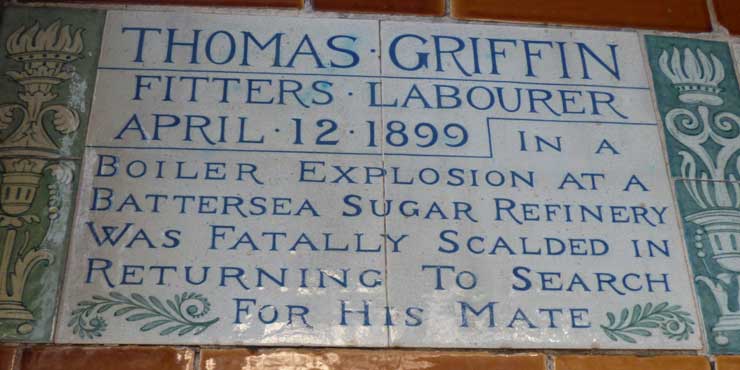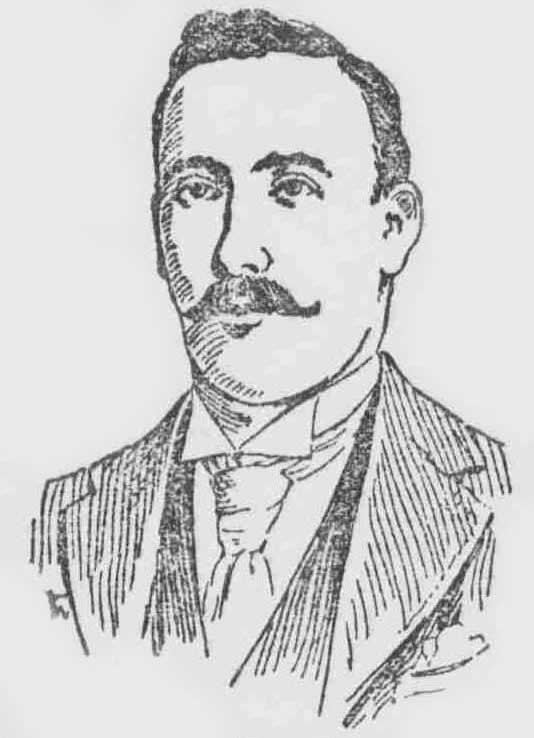
The death of Thomas Griffin (1877 - 1899) was, according to the Deputy Coroner at the inquest into it, "a peculiarly sad case", as Griffin was due to be married on the 11th of the following month.
His Postman's Park Plaque briefly summarizes the tragedy that befell him. It reads, "Thomas Griffin Fitters Labourer, April 12 1899. In a Boiler Explosion At A Battersea Refinery Was Fatally Scalded In Returning To Search For His Mate."
Lloyd's Weekly Newspaper published the following report into what befell the poor man, shortly after he arrived for work on the morning of that fateful day:-
"The Battersea coroner held an inquiry on Monday, on the body of Tom Griffin, aged 21, a fitter's labourer, employed at Messrs. Garton, Hill, and company's sugar refinery, York-place, Battersea.
Frederick Biggs, engineer at the sugar refinery, said that the deceased was his "labourer."
On Wednesday, April 12, when work was about to commence, Griffin was in the hydraulic room, and the witness went to let some water out of a pipe.
The main pipe gave a slight jar, and something hit him in the ribs and knocked him into the corner of the landing.
He got out of the room.
He saw nothing of Griffin. If Griffin had remained in the hydraulic room he would have been safe. There was nothing to take him into the room where he was scalded.
It was the main steam pipe from the engine that burst, an eight inch cast iron pipe, and there was no sign of a crack or a flaw where the fracture occurred.
Samuel Tipler, a fellow labourer of Griffin's, said that the report was followed by a rushing of steam.
Griffin stood for a second, and then exclaimed, "My mate, my mate.' and rushed through the steam.
Then somebody ran against the wall and staggered into the yard.
They rushed after him and found it was Griffin, who had been dreadfully scalded."

A Portrait Of Thomas Griffin (1877 - 1899)
From Lloyd's Weekly Newspaper, 23rd April 1899
Copyright, The British Library Board
Under the above headline The Morning Post gave a little more detail of the inquest at which it was universally agreed that Thomas Griffin had, indeed, acted heroically:-
"Yesterday. at the Battersea Coroner's Court, Mr. W. Schroeder, the Deputy-Coroner, held an inquest on Thomas Griffin, 21, fitter's labourer, lately residing in Usk-road, Battersea, who died in the Bolingbroke Hospital, Wandsworth-common, on Wednesday from scalds.
The inquiry was attended by Mr. Arbuckle, Factory Inspector. Mr. Harper, Barrister, appeared for Messrs. Garton, Hill and Co., sugar refiners, Southampton Wharf, Battersea
Frederick Biggs, engineer at Messrs. Garton, Hill. and Co.'s works, said that Griffin worked under him as a fitter.
Shortly after six o'clock on Wednesday morning last Griffin and others were preparing for work in the boiler-room when a main steam pipe in an adjoining room, in which Witness was, burst with a loud explosion.
Witness was injured, but making his way to the door of the room he rolled down the steps, and getting on his feet went to have the steam shut off.
Samuel Tipler, a labourer at the works, said that Griffin was with him and others in the boiler-room at the time of the explosion in the next room.
The engine-driver shut the door communicating the two rooms, and told them all not to leave the room.
Griffin, however. rushed out of the room crying "My mate," alluding evidently to the Witness Biggs.
Soon afterwards Griffin returned, scalded all over his head and hands.
The skin was hanging from his hands.
He was taken to the office, his wounds were dressed, and he was sent to the hospital.
The manager said this was the first accident of the kind that had occurred at the works. The pipe, a cast-iron one five-eighths of an inch thick, had had steam in it three days before bursting. It burst when the pressure was only 50lb. to the inch, and was completely severed, the parts being blown nine inches apart.
Dr. Lister, of the Bolingbroke Hospital, said that Griffin wan severely scalded over the whole of the body. He died from shock the same day as admitted.
Mr. Harper said it was a peculiarly sad case, as Griffin was to have been married on the 11th inst.
The case was practically the same as that of Stoker Lynch, who went to look after his mate.
The Jury returned a verdict of death by misadventure, adding that Griffin died like a hero.
The Deputy-Coroner: We all recognise that he acted heroically on this occasion, and we appreciate the act."
Mr Harper, the barrister who attended the inquest on behalf of Thomas Griffin's employers, Messrs. Garton, Hill, and Co told the inquest, reported the Evening Standard on 18th April 1899 that, "His clients fully realised the splendid conduct and the high motive which prompted the deceased which prompted the deceased to act as he did."
The Deputy Coroner was, so the newspaper reported, in full agreement and he closed the inquest by telling the court:-
"The conduct of a man like him deserves to be recorded.
No doubt there are heroes in everyday life, but they do not come to the front, so we do not hear of them."